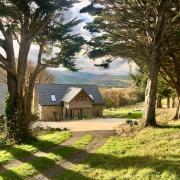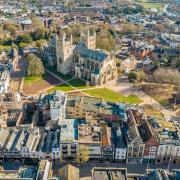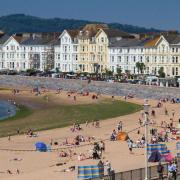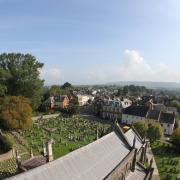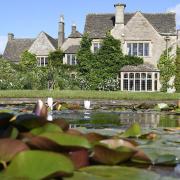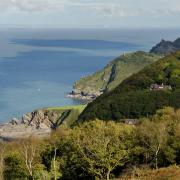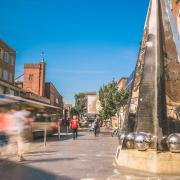Sandwiched between the River Tamar in Devon, Dartmoor and the sea, Plymouth is surrounded by wild and wonderful open spaces and one of the country's most diverse marine environments, as Trudy Turrell discovers Photos by Neville Stanikk
Blue Space
Take a short stroll in any direction from Plymouth city centre and you will find miles of open waterfront, parkland and nature reserves, but as in many cities, its residents don’t always know about the natural world on their doorstep. Now there are some innovative projects aimed at changing local people’s use and perceptions of their environment, whilst conserving the city’s nature too.
From the Tamar Estuary to Plymouth Sound there are great blue spaces around the city. Designated as a European Marine Site, the Sound and surrounding coastline is rich with marine wildlife. Most stays hidden beneath the waterline, but Plymouth’s Marine Biological Association (MBA) aims to bring this amazing wildlife within reach of every Plymothian.
By taking school groups, families and communities out to the seashore, their Blue Space project connects people with their watery environment. With good bathing water and a host of small beaches right off the Hoe, it comes as a surprise that many local families don’t use their local beaches. Working with Malborough Primary School Devonport, just a stone’s throw from the sea, MBA staff took some pupils for their first visit to the beach and there are plans for seashore and snorkel safaris.
Plymouth’s Blue Mile
If anyone could inspire people to get out and explore Plymouth’s fabulous water, it would be Conrad Humphreys. This Devon- born sailor, who studied ocean science at Plymouth University, became the fifth British sailor to complete the Vend�e Globe; a punishing, non-stop solo round-the-world race.
Now he’s using his determination and love of the sea to enthuse others to swim in it, sail or kayak on it or just walk beside it. The rivers and sea can offer an enticing ‘blue gym’ as well as an environment to clear the head and mind. Conrad explained that by enjoying their natural marine environment, people should feel motivated to care for it.
The Blue Mile – Race for the Environment is the UK’s newest mass-participation event designed to get people immersed in Plymouth’s wonderful watery environment and raise some money for charity. It will be open to everyone to take part and complete a mile in, on or next to a blue environment. The inaugural Blue Mile event will take place in front of Plymouth’s waterfront on the 3-4 July. All those swimming, paddling or walking a mile will be raising money for the World Wildlife Fund or a personal chosen charity.
Green Space Stepping Stones to Nature
Connecting people to their open spaces is the aim of the exciting new �1 million four-year Lottery-funded Stepping Stones to Nature project. I spoke to its Co-ordinator, Zoe Goss, who explained how Stepping Stones is bringing together experts from public health, parks, protected landscapes, play, rights of way and outdoor education to ensure that people of all ages and backgrounds have the opportunity to use Plymouth’s green spaces.
Focusing first on nature reserves close to housing areas, Stepping Stones is working closely with local communities to increase their use. In Forder Valley on the north-east of the city and Woodland Wood in the north, locals requested improved paths and signage, seating and play features to make the reserves feel more welcoming, easy to navigate and, most of all, a cared-for space.
In Efford Valley local residents and young people are developing their own Green Space Action Plan with help from experts. Now a healthy activity trail in the woods, a wetland area, and an outdoor classroom are in the pipeline. Sometimes, people just need reminding that they can have a fun and free day out in the open. A recent den-building family day at Woodland Wood left timber frames on site that just invite visitors to make a den of their own.
In the process of turning open-space use around, Stepping Stones has been changing the lives of some individuals too. Zoe told me Bryan Cann’s story. Homeless for two years, Bryan lived on a 4ft bench at Devil’s Point; now he works as part of the Groundwork team improving Woodland Wood, a place he used to play in as a child. Proud of the contribution he is making to the area, he hopes that his 26-week placement will lead to him getting a permanent job.
“My wish is that Plymouth’s green spaces will be cared for by the people who use and love them,” says Zoe, who introduced me to yet more innovative projects all round the city.
Diggin’ It
Abandoned allotments, thick with brambles and not even a shed, were the unpromising site of what is now an oasis of vegetable plots tended by more than 30 volunteers. Just one mile from the city centre, the Diggin’ It plots now sell quality organic vegetables to shops and restaurants. Whilst teaching the varied skills of gardening and food production, the Diggin’ It team provide opportunities for vulnerable or socially disadvantaged people to gain confidence, self-esteem and self-sufficiency skills into the bargain. Project co-ordinator David Sharp explains that the job is “not just working with plants – there is a feeling that you are not just creating a garden, but working with people, improving their social skills, and giving them peace of mind”.
War pensioner Matt Rawlins is one of the project’s long-term volunteers: “I had to get out and do something active with my life,” he says. “Diggin’ It is brilliant and has been a lifesaver to me. Working outdoors with other people has relaxed me so much that I don’t suffer the effects of trauma any more.” He now passes his skills on to other volunteers.
Devonport Park
Close to Devonport docks is one of Plymouth’s gems. Opened in 1858, Devonport Park boasts statues, historic monuments, beautiful flower borders and acres of parkland in which to stroll beneath mature specimen trees. Seeing it decline over previous decades, local people formed a ‘friends’ group five years ago and raised �5 million in partnership with Plymouth City Council. This has enabled the restoration of the Swiss-style park keeper’s cottage, a new bowls pavilion, memorials, fountains and a new bandstand in the model of its Victorian predecessor. Friends also get stuck into gardening in the park too. Replanting flower beds and the rose and memorial gardens has enabled them to enter this once neglected park into Britain in Bloom. What’s more, a dozen of the volunteers have been inspired to take horticultural qualifications through Duchy College, becoming gardeners of the future.
For further information visit www.thebluemile.org
Useful contacts:
www.plymouth.gov.uk/steppingstones
www.diggin-it.org



